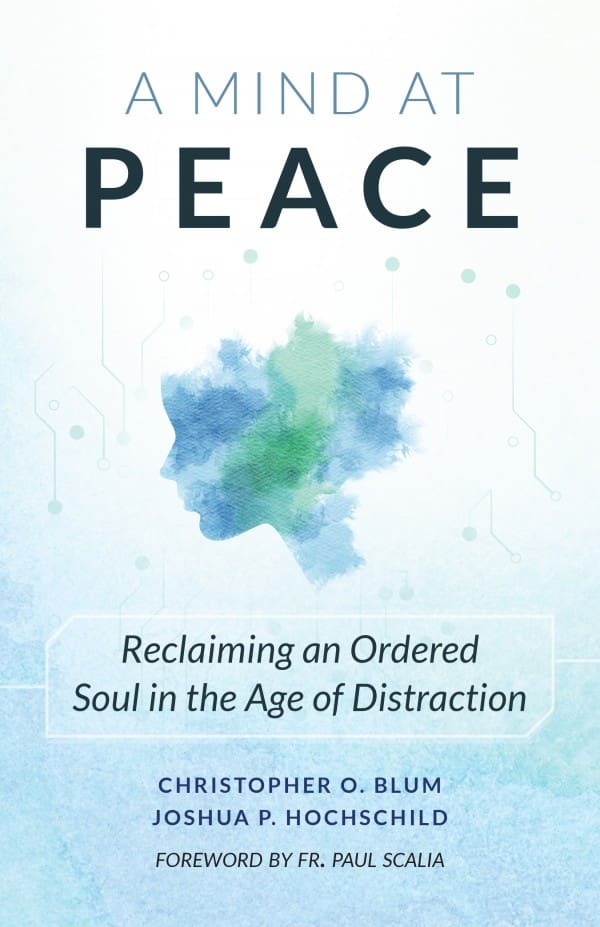Lord, Jesus, may I know myself and may I know You.
— St. Augustine
Saint Augustine famously defined peace as “the tranquility of order.” We all intuit the truth of that statement. We know that if we ourselves are properly ordered — in the various dimensions of our lives, in our union of body and soul, of intellect, will, and passions — then we will be at peace, no matter the difficulties around us. By the same token, we know that if we lack that interior order — if we are at odds with ourselves — then no amount of external order can bring us peace.
But we live in a schizophrenic culture. As much as we might want that peace, we still desire the world’s distractions. We love the gifts of the digital age: “Big Data,” connectivity, constant streaming, and so forth — even as we sense a need for quiet, for relief from information and communication overload. We want both the promises of the digital age and the habit of recollection (“mindfulness,” as it is now fashionable to say). It is increasingly clear how difficult it is to have both — to be at once digitalized and recollected.
Our tools have gotten in the way. Of course, all tools get in the way. While you use a hammer, you cannot shake hands. When you saw wood, you cannot write a letter. But what we experience now is different. Our tools — the new, digital technologies — do not just get in our way but get in the way of our selves. The insertion of digital technology into every sphere of life disconnects us not just from this thing or that but from our very selves. To think, reason, see, and touch have all taken on new meaning.
Indeed, our humanity now seems proportioned to technology. The smartphone was initially designed to the human hand — to fit its size, shape, and motion. Now we fit ourselves to our digital devices. They have become the measure. We bring them everywhere (to work, in the car, on the plane, on the train . . .) and turn to them for every need (“There’s an app for that”). We even describe ourselves in their terms. People “outsource” their memory and “process” rather than think. Human sight, meant to gaze on God’s creation, now looks at everything through a screen. For many people the sense of touch is engaged most of all on a touch pad.
Salvation, on the other hand, is proportioned to our humanity. And the Word became flesh and dwelt among us (John 1:14). God did not demand that we rise to His level. He proportioned Himself to us, so that we mere creatures can receive His grace and truth. Thus, the language of salvation is that of the human senses: Hear, O Israel! . . . Taste and see the goodness of the Lord! . . . Behold, the Lamb of God! . . . Take and eat. . . . The Church’s sacramental economy likewise depends on simple human acts: pouring water, anointing with oil, eating bread, drinking wine, speaking vows.
The psalmist addresses God as salutare vultus mei — “the Savior of my face” (Ps. 42:6, 12; 43:5). That phrase summarizes things neatly. To be human means to have a face — to be capable of relationships, and ultimately of beholding God’s glory. Sin robs us of that. It turns us inward, away from others — in effect, without a face. We need to be restored to ourselves — to “save face.”
Today’s technology has, in a sense, robbed us of our face, has disconnected us from ourselves. Our very faces have disappeared behind screens. In this regard, too, God is the Savior of my face. When our tools get in our way and we forget what it means to be human, God can restore us to ourselves. This is not a book about technology. It is a book about being restored to ourselves and thus finding peace. There are many good books on the dangers of technology.
This book is different in both its depth and its practicality. Our crisis calls for sound philosophy, a clear explanation of human nature — so that we can reacquaint ourselves with ourselves. It is not enough to observe that technology can be bad for us. We must also know the good: the good that we are and what is good for us. The crisis likewise calls for theology. We have been created by God and for God — and He alone restores us. Finally, the crisis calls for practical advice — so that the philosophy and theology do not remain theoretical but gain traction in our lives.
Christopher Blum and Joshua Hochschild have woven these elements together in this powerful little book. It is deep in the wisdom of what it means to be human, clear in God’s power to save, and simple in tactics for moving forward. It is not primarily about “disconnecting” from our devices but about reconnecting with God and therefore with ourselves. May its readers be many, and may it help them come to know the peace He promised.
+
This article is adapted from the book A Mind at Peace by Christopher O. Blum & Joshua P. Hochschild, which is now available from Sophia Institute Press.
 Art for this post: Cover and featured image used with permission.
Art for this post: Cover and featured image used with permission.




